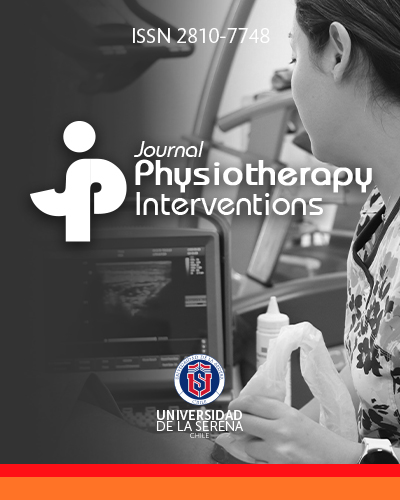Abstract
Background:
Research in physiotherapy has experienced sustained growth in recent years. However, thematic, structural, and epistemic gaps persist, limiting its comprehensive and equitable development. This study analyzes the thematic, geographic, and collaborative configuration of global scientific production in physiotherapy.
Methods:
A scientometric and bibliometric analysis was conducted on 26,518 original articles indexed in Web of Science between 2018 and 2023. VOSviewer and InCites tools were used to examine keyword co-occurrence, institutional collaboration, geographic distribution, and funding sources. A specific thesaurus, fractional counting, and a minimum threshold of 10 occurrences were applied to consolidate terms and reduce terminological dispersion.
Results:
Five main clusters were identified: pain management and manual therapy; cardiac rehabilitation; the interrelationship between mental health and health education; post-stroke rehabilitation; and respiratory physiotherapy in intensive care. Scientific output is concentrated in Global North countries, with Brazil leading in Latin America. Thematic gaps were observed in the incorporation of emerging technologies, biopsychosocial approaches, and the integration of social determinants of health. Topics such as long COVID and physiotherapy in mental health remain underrepresented. There is also low editorial visibility of Spanish-speaking Latin American countries in high-impact databases.
Conclusions:
This study provides a critical characterization of recent research in physiotherapy, identifying both consolidated areas and emerging gaps. The findings highlight the need to promote more inclusive international collaborations, strengthen regional editorial networks, and expand the approach to interdisciplinary dimensions that are still underexplored in the field.
References
Sánchez-Cuesta FJ. Avances en fisioterapia: investigación y práctica actual. Editorial UNACH; 2024. https://doi.org/ 10.37135/u.editorial.05.111.
Sackett, D. L., Rosenberg, W. M., Gray, J. A., Haynes, R. B., & Richardson, W. S. (1996). Evidence based medicine: what it is and what it isn't. BMJ (Clinical research ed.), 312(7023), 71-72. https://doi.org/10.1136/bmj.312.7023.71
Bispo Júnior JP. La fisioterapia en los sistemas de salud: marco teórico y fundamentos para una práctica integral. Salud Colectiva. 2021 Oct 18;17:e3709. https://doi.org/10.18294/sc.2021.3709. PMID: 34752022.
World Confederation for Physical Therapy. WCPT guideline for physical therapist professional entry level education. London, UK: WCPT; 2011. www.wcpt.org/guidelines/entry-level-education
Higgs, K. (2001). Portrait of the physiotherapy profession. In Journal of Interprofessional Care (Vol. 15, Issue 1). https://doi.org/10.1080/13561820020022891
Rodrigues, A., Muñoz, G., Jácome, C., Langer, D., Parry, S. M., & Burtin, C. (2020). Current developments and future directions in respiratory physiotherapy [Review of Current developments and future directions in respiratory physiotherapy]. European Respiratory Review, 29(158). https://doi.org/10.1183/16000617.0264-2020
García Ríos MC, et al. Análisis temático de la disciplina Fisioterapia en la Web of Science. Fisioterapia. 2010;32(4):159–64.
Calvo Fuente MV. Análisis de co-palabras en fisioterapia: delimitación temática y redes de conocimiento en España [Tesis Doctoral]. Universidad de Alcalá; 2023.
González-Alcaide G, Valderrama-Zurián JC, Aleixandre-Benavent R. La cienciometría como herramienta para analizar el impacto de la investigación científica en una región. Revista Española de Documentación Científica. 2012;35(2):221-233. https://doi.org/ 10.3989/redc.2012.2.858.
Morales-Osorio MA. Del modelo biomédico al modelo biopsicosocial: el desafío pendiente para la fisioterapia en el dolor musculoesquelético crónico. Rev Fac Cienc Salud UDES. 2016;3(2):97–101. https://doi.org/10.20320/rfcsudes.v3i2.200
Benton AD, Benton DC. Evolution of physiotherapy scholarship: A comparative bibliometric analysis of two decades of English published work. Physiother Res Int. 2019;24:e1760. https://do.org/10.1002/pri.1760.
Moseley, A. M., Herbert, R. D., Sherrington, C., & Maher, C. G. (2002). Evidence for physiotherapy practice: a survey of the Physiotherapy Evidence Database (PEDro). Australian Journal of Physiotherapy, 48(1), 43-49.
Elola, I. (2018). Writing in Spanish as a Second and Heritage Language: Past, Present, and Future. In Hispania (Vol. 100, Issue 5, p. 119). American Association of Teachers of Spanish and Portuguese. https://doi.org/10.1353/hpn.2018.0029
O’Brien, M. A. (2001). Keeping up-to-date: continuing education, practice improvement strategies, and evidence-based physiotherapy practice. In Physiotherapy Theory and Practice (Vol. 17, Issue 3, p. 187). Taylor & Francis. https://doi.org/10.1080/095939801317077641
Organización de Estados Iberoamericanos (OEI), UNESCO. El estado de la ciencia: principales indicadores de ciencia y tecnología 2024. Red Iberoamericana de Indicadores de Ciencia y Tecnología (RICYT); 2024. p. 18. Disponible en: https://www.ricyt.org
Fricker M. Epistemic Injustice: Power and the Ethics of Knowing [Internet]. Oxford: Oxford University Press; 2007 [citado 1 de abril de 2025]. Disponible en: https://doi.org/10.1093/acprof:oso/9780198237907.001.0001
Clarivate Analytics. Indicators Handbook [Internet]. 2025 [citado 1 de abril de 2025]. Disponible en: https://incites.zendesk.com/hc/en-gb/sections/22667074311953-Indicators-Handbook
Hicks D, Wouters P, Waltman L, de Rijcke S, Rafols I. The Leiden Manifesto for research metrics. Nature. 2015;520(7548):429–31. Disponible en: https://doi.org/10.1038/520429a
Page MJ, McKenzie JE, Bossuyt PM, Boutron I, Hoffmann TC, Mulrow CD, et al. The PRISMA 2020 statement: an updated guideline for reporting systematic reviews. BMJ. 2021;372:n71. Disponible en: https://doi.org/10.1136/bmj.n71
UK Research and Innovation. Research Excellence Framework (REF) 2021 [Internet]. London: REF; 2021 [citado 1 de abril de 2025]. Disponible en: https://www.ref.ac.uk/

This work is licensed under a Creative Commons Attribution 4.0 International License.


